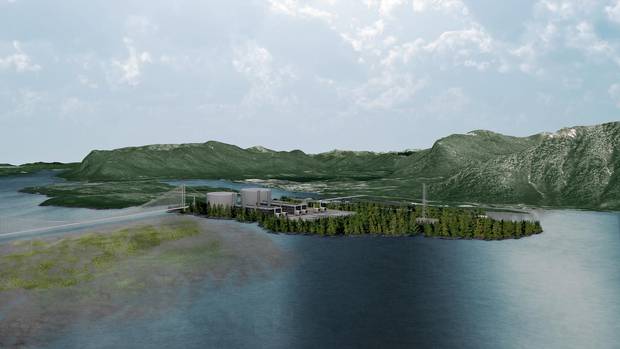Pacific NorthWest LNG is scrambling to come up with a Plan B after the Lax Kw’alaams First Nation soundly rejected the Malaysian-led project’s $1-billion cash offer aimed at securing its support for a B.C. liquefied natural gas terminal.
The company said project leader Petronas and its five Asian partners are willing to make changes in response. A key option is to relocate a planned suspension bridge and trestle that the native people said was too close to the environmentally sensitive habitat of juvenile salmon in Flora Bank, which is part of the traditional territory of Lax Kw’alaams.
“It’s about doing the right thing,” Pacific NorthWest LNG president Michael Culbert said in an interview on Wednesday. “We have heard there are concerns about Flora Bank and the stability of Flora Bank.”
The overwhelming opposition by Lax Kw’alaams members in three rounds of voting illustrates the many hurdles – from aboriginal criticisms to environmental concerns – that even the most prominent project among 19 B.C. LNG proposals must clear before becoming reality.
The lure of the money, which would be spread over 40 years, was not enough to overcome the native group’s concerns that the bridge and trestle would harm juvenile salmon habitat in Flora Bank, located next to the proposed export terminal site on Lelu Island in northern British Columbia.
The Lax Kw’alaams council said in a statement the vote “sends an unequivocal message this is not a money issue. This is environmental and cultural.”
Flora Bank is a sandy, reef-like area that is visible at low tide. The native group opposes any type of development that it does not consider enviromentally sound.
One possible change for Pacific NorthWest LNG’s proposal is to move the planned suspension bridge and trestle that would carry LNG pipes out to tanker ships so that they are angled slightly farther away from Flora Bank, although studies of engineering issues and shipping channels will dictate what is viable.
The plan to transport the LNG from the terminal on Lelu Island over a bridge, a structure that would be mainly above water, to a deep-berth location in Chatham Sound, was intended to minimize the need for dredging and avoid damaging the sensitive eelgrass beds in Flora Bank.
While the Petronas-led group’s defeat does not sound the death knell for British Columbia’s fledgling LNG industry, it is a warning that aboriginal people will vigorously defend their traditional territory against projects that place fish stocks at risk. The opposition by the Lax Kw’alaams also underscores that many more difficult months and years lie ahead before complex engineering solutions are found to reduce environmental risks, especially to protect the habitat of fish that are a major food source for First Nations.
Pacific NorthWest LNG submitted a 3-D modelling study of Flora Bank to the Canadian Environmental Assessment Agency (CEAA) last week. “We’ve not only redesigned the project to minimize or ultimately eliminate the impact, but then we’ve gone on and continued through the CEAA process to do substantial supplementary 3-D modelling,” Mr. Culbert said. “We’ve shown and demonstrated that we’re willing to work and modify things as we move forward.”
The band council said it will support LNG under the right conditions: “Lax Kw’alaams is open to business, to development and to LNG.”
The suspension bridge and trestle would cost about $1-billion, according to industry estimates. In total, the entire Petronas-led LNG project is forecast to cost $36-billion, including TransCanada Corp.’s proposed $5-billion Prince Rupert gas transmission pipeline to bring the natural gas to the terminal.
Lax Kw’alaams Mayor Garry Reece and 12 elected councillors will make the final decision on behalf of the 3,600-member band. They left the door open for good-faith negotiations if the proposed solutions would not be too close to Flora Bank.
“The terminal is planned to be located in the traditional territory of the Lax Kw’alaams,” the aboriginal group’s band council said. “There are suggestions governments and the proponent may try to proceed with the project without consent of the Lax Kw’alaams. That would be unfortunate.”
In the final round of voting, Lax Kw’alaams members produced another unanimous rejection on Tuesday night. The package, including $1-billion in cash and $108-million worth of provincial land transfers, works out to the equivalent of about $320,000 per person.
B.C. Aboriginal Relations Minister John Rustad said the province will help bridge the gap between Pacific NorthWest LNG and the Lax Kw’alaams.
BRENT JANG
VANCOUVER — The Globe and Mail
Published Wednesday, May. 13 2015, 10:36 PM EDT
Last updated Wednesday, May. 13 2015, 11:29 PM EDT

